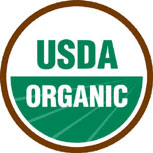 Even though we’ve entered the information age, agriculture still defines our society. Agriculture employs nearly half the world’s population, and for thousands of years, all crops were grown organically. Organic farming was the only option; petroleum-based fertilizers and pesticides did not exist.
Even though we’ve entered the information age, agriculture still defines our society. Agriculture employs nearly half the world’s population, and for thousands of years, all crops were grown organically. Organic farming was the only option; petroleum-based fertilizers and pesticides did not exist.
Technology developed during World War II spurred sweeping changes in agriculture. Ammonium nitrate (used for munitions during the war) evolved into ammonium nitrate fertilizer. Nerve gas production led to the development of potent pesticides, and thus, modern agriculture was born.
 Modern agriculture relies on synthetic fertilizers and pesticides, genetic engineering, and large-scale mechanization to produce maximum crop yields. To make production more efficient, modern agriculture also practices monoculture, which refers to the widespread planting of a single crop. Monoculture contributes to soil erosion and saps the soil of its fertility.
Modern agriculture relies on synthetic fertilizers and pesticides, genetic engineering, and large-scale mechanization to produce maximum crop yields. To make production more efficient, modern agriculture also practices monoculture, which refers to the widespread planting of a single crop. Monoculture contributes to soil erosion and saps the soil of its fertility.
The main problem with modern agriculture, however, is that the synthetic chemicals never disappear. When you eat an apple grown using synthetic pesticides, traces of the pesticides remain in the apple, and the chemicals end up in your fat cells. Similarly, cotton grown using synthetic chemicals retains traces of the chemicals after it is woven into a fabric. The United States alone dumps 8.5 million tons of pesticides on cotton fields annually, and those chemicals are then absorbed into the plant, air, soil, water, and eventually, our bodies.
Not only are many people allergic to the synthetic chemicals used in modern agriculture, but many of the chemicals are also carcinogens (cancer-causing agents). A 2001 study demonstrated that children fed organic diets had significantly lower exposure to carcinogenic pesticides and in 2005, the Environmental Protection Agency showed that children acquire 50% of their lifetime cancer risks during their first two years of life. Synthetic pesticides have also been shown to suppress the immune system, disrupt hormones, and damage the nervous system. Pesticide exposure may also affect male reproductive function and has been linked to miscarriages in women. Besides harming humans, modern agricultural practices also rapidly deplete natural resources and seriously pollute the soil, water, and air.
 Organic farming, on the other hand, promotes the health of both consumers and the environment. Started after the war as a reaction against modern toxic farming methods, organic farming excludes the use of synthetic pesticides, herbicides, fertilizers, and genetic engineering. Organic farmers respect their land: they feed and build the soil with natural fertilizers; they protect crops against insects using natural insect predators, barriers, or traps; and they control weed growth with crop rotation, hand weeding, cover crops, and mulches.
Organic farming, on the other hand, promotes the health of both consumers and the environment. Started after the war as a reaction against modern toxic farming methods, organic farming excludes the use of synthetic pesticides, herbicides, fertilizers, and genetic engineering. Organic farmers respect their land: they feed and build the soil with natural fertilizers; they protect crops against insects using natural insect predators, barriers, or traps; and they control weed growth with crop rotation, hand weeding, cover crops, and mulches.
In the past decade, the organic agriculture market has grown exponentially because more consumers are learning that organic farming is better for them and their environment. Despite its growth, the business of organic farming is still in jeopardy because it cannot compete with large, industrial farming operations. The future of organic farming depends on you, the consumer. If you want to help rid your body and your environment of toxic chemicals, then look for the certified organic label and support organic farming.
See Organic Cotton Blankets
See Organic Cotton Bed Linens
See Royal-Pedic Organic Cotton Mattresses
